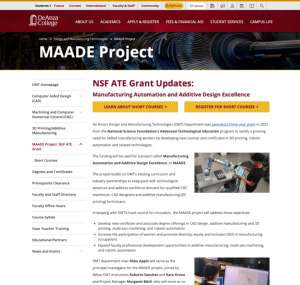Creating Pathways for Technicians in Advanced Design and Manufacturing Technologies

The manufacturing sector is undergoing rapid changes as additive manufacturing (also known as 3D printing) and robotic automation transform the way products are designed and produced. These changes have created an industry demand for machinists and manufacturing technicians who are capable of applying these technologies in manufacturing facilities. However, the number of graduates from technician programs that are focused on these technologies has not kept pace with the demand. Technical education programs are needed that help students acquire the knowledge, skills, and abilities to successfully apply these emerging technologies. There is also an opportunity to increase the number of college instructors who are capable of providing technical education programs in advanced manufacturing. This project will develop new courses and certificate programs related to additive manufacturing and automation, provide industry mentors and student support services to broaden participation in the technical workforce, and provide professional development opportunities for instructors at other institutions. This project will create pathways for students to pursue high paying jobs with career advancement potential in the Silicon Valley region.
The goals of this project are to (1) increase the number of qualified technicians who can apply advanced design and manufacturing technologies, (2) improve the retention and success of students from historically underrepresented groups, and (3) increase the number of institutions that are capable of offering technical education in this field. A survey of industry partners in the region will be conducted to determine the knowledge, skills, and abilities that are necessary for advanced design and manufacturing technicians. Based on the survey results, new courses will be developed and existing courses will be revised to incorporate the new content. These courses will be used to create new certificates in multi-axis computer controlled machining and robotic automation that are aligned with industry certifications. In collaboration with industry partners, the project team will develop a professional mentoring program in which professionals from industry mentor a group of students in the program who are from historically underrepresented groups. An instructor professional development curriculum will be developed that focuses on computer-aided design, additive manufacturing, multi-axis machining, and robotic automation. The professional development program will be offered twice a year for college manufacturing faculty from the San Francisco Bay region.
About

Comments